I am trying to save an pyspark.sql.dataframe.DataFrame in CSV format (could also be another format, as long as it is easily readable).
So far, I found a couple of examples to save the DataFrame. However, it is losing information everytime that I write it.
Dataset example:
# Create an example Pyspark DataFrame
from pyspark.sql import Row
Employee = Row("firstName", "lastName", "email", "salary")
employee1 = Employee('A', 'AA', 'mail1', 100000)
employee2 = Employee('B', 'BB', 'mail2', 120000 )
employee3 = Employee('C', None, 'mail3', 140000 )
employee4 = Employee('D', 'DD', 'mail4', 160000 )
employee5 = Employee('E', 'EE', 'mail5', 160000 )
department1 = Row(id='123', name='HR')
department2 = Row(id='456', name='OPS')
department3 = Row(id='789', name='FN')
department4 = Row(id='101112', name='DEV')
departmentWithEmployees1 = Row(department=department1, employees=[employee1, employee2, employee5])
departmentWithEmployees2 = Row(department=department2, employees=[employee3, employee4])
departmentWithEmployees3 = Row(department=department3, employees=[employee1, employee4, employee3])
departmentWithEmployees4 = Row(department=department4, employees=[employee2, employee3])
departmentsWithEmployees_Seq = [departmentWithEmployees1, departmentWithEmployees2]
dframe = spark.createDataFrame(departmentsWithEmployees_Seq)
In order to save this file as CSV, I firstly tried this solution:
type(dframe)
Out[]: pyspark.sql.dataframe.DataFrame
dframe.write.csv('junk_mycsv.csv')
Unfortunately, that result in this error:
org.apache.spark.sql.AnalysisException: CSV data source does not support struct<id:string,name:string> data type.;
That is the reason why I tried another possibility, to convert the spark dataframe into a pandas dataframe, and save it then. As mentioned in this example.
pandas_df = dframe.toPandas()
Works good! However, If I show my data, it is missing data:
print(pandas_df.head())
department employees
0 (123, HR) [(A, AA, mail1, 100000), (B, BB, mail2, 120000...
1 (456, OPS) [(C, None, mail3, 140000), (D, DD, mail4, 1600...
As you can see in the snapshot below, we are missing information. Because the data should be like this:
department employees
0 id:123, name:HR firstName: A, lastName: AA, email: mail1, salary: 100000
# Info is missing like 'id', 'name', 'firstName', 'lastName', 'email' etc.
# For the complete expected example, see screenshow below.
Just for information: I am working in Databricks, with Python.
Therefore, how can I write my data (dframe from the example above) without losing information?
Many thanks in advance!
Edit Adding a picture for Pault, to show the format of the csv (and the headers).
Edit2 Replacing the picture for example csv output:
After running Pault's code:
from pyspark.sql.functions import to_json
dframe.select(*[to_json(c).alias(c) for c in dframe.columns])\
.repartition(1).write.csv("junk_mycsv.csv", header= True)
The output is not tidy, since most column headers are empty (due the nested format?). Only copying the first row:
department employees (empty ColName) (empty ColName) (and so on)
{\id\":\"123\" \"name\":\"HR\"}" [{\firstName\":\"A\" \"lastName\":\"AA\" (...)
